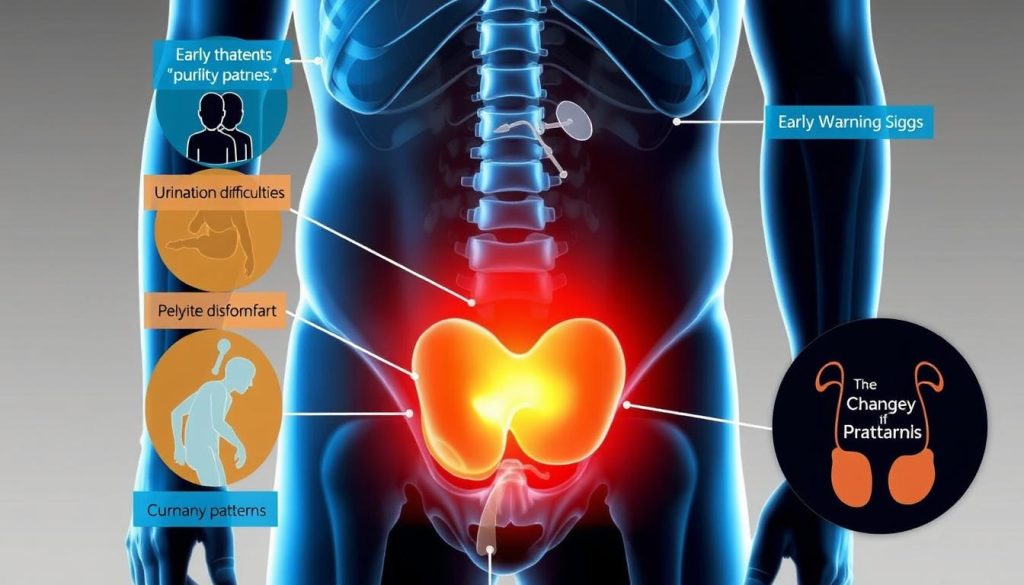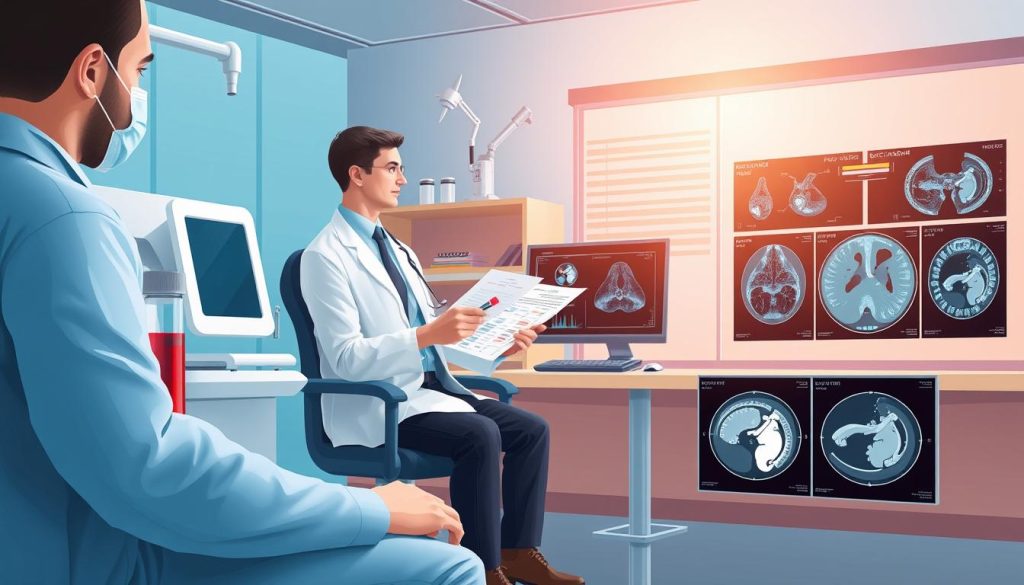Prostate cancer is a big worry for men all over the world. Finding it early can really help with treatment and how well you’ll do. This guide covers the main points of finding prostate cancer, like risk factors, early signs, and how to screen for it.
Knowing the symptoms and risks of prostate cancer is key to acting fast. We’ll look at common signs and the tests used to find this disease. Learning about these can help you keep your prostate healthy and get medical help when needed.
If you’re worried about your health or someone you care about, this detailed guide is for you. It’s packed with important info on spotting and dealing with prostate cancer. Let’s get into the crucial details you need to know about finding and treating this common men’s health problem.
Understanding Prostate Cancer and Risk Factors
Prostate cancer is a serious health concern for men. Knowing the risk factors can help with early detection and prevention. Let’s explore key factors that may increase your chances of developing this disease.
Age and Family History Considerations
As men grow older, their risk of prostate cancer rises. Most cases occur in men over 50. If your father or brother had prostate cancer, your risk doubles. Regular screenings become crucial for those with family history.
Genetic Predisposition and Ethnicity
Certain genetic mutations can increase prostate cancer risk. African American men face higher rates and more aggressive forms of the disease. Understanding your genetic background is vital in assessing personal risk.

Lifestyle Factors That Increase Risk
Diet and exercise play roles in prostate cancer prevention. High-fat diets and lack of physical activity may increase risk. Maintaining a healthy weight and eating plenty of fruits and vegetables can help lower your chances of developing prostate cancer.
| Risk Factor | Impact on Prostate Cancer Risk |
|---|---|
| Age over 50 | Significantly increases risk |
| Family History | Doubles risk if father or brother affected |
| African American Ethnicity | Higher risk and more aggressive forms |
| High-Fat Diet | May increase risk |
| Lack of Exercise | Associated with higher risk |
Understanding these risk factors is crucial in learning how to detect prostate cancer early. By being aware of your personal risk profile, you can take proactive steps towards prostate cancer prevention and timely screening.
Early Warning Signs and Symptoms of Prostate Cancer
Knowing prostate cancer symptoms is key for catching it early. Men should watch for body changes that could mean trouble. Let’s look at the main signs and when to see a doctor.

Urinary Changes and Warning Signs
Urinary changes are often the first sign of prostate cancer. These include:
- Frequent urination, especially at night
- Difficulty starting or stopping urination
- Weak or interrupted urine flow
- Burning sensation during urination
- Blood in urine or semen
Physical Symptoms to Watch For
Some men may feel physical discomfort due to prostate cancer:
- Pain or discomfort in the pelvic area
- Bone pain, particularly in the lower back, hips, or thighs
- Unexplained weight loss
- Erectile dysfunction
When to Seek Medical Attention
If you notice these symptoms, don’t worry. Many things can cause similar issues. But, it’s crucial to talk to your doctor. Early detection can greatly improve treatment results.
“Regular check-ups and open communication with your healthcare provider are key to maintaining prostate health and catching any issues early.”
Some men with prostate cancer won’t show symptoms early on. That’s why regular screenings are important. This is especially true for men over 50 or those with higher risk factors.
How to Detect Prostate Cancer: Screening Methods and Tests
Prostate cancer screening is key to catching it early. Two main tests are used: the prostate-specific antigen (PSA) test and the digital rectal exam. These help find problems before symptoms show up.
The PSA test checks the blood for prostate-specific antigen levels. High levels might mean cancer, but can also show other issues. It’s important for men to talk to their doctor about getting a PSA test.
A digital rectal exam lets a doctor feel the prostate gland through the rectum. This can find lumps or other issues that need more checking.
“Regular screenings are crucial for early detection. Men should start discussing prostate health with their doctors around age 50, or earlier if they have risk factors.”
How often you need a prostate cancer screening depends on your risk and past test results. Some men might need a test every year, while others might not need one as often.
- PSA test: A simple blood draw
- Digital rectal exam: Quick physical examination
- Screenings typically begin at age 50
- Earlier screenings for high-risk individuals
Even though these tests can find prostate cancer, they’re not 100% accurate. False positives can cause worry and more tests. It’s vital to talk about the pros and cons of screening with your doctor.
Advanced Diagnostic Procedures and Testing Options
Doctors use many tests to find prostate cancer. These tests help find cancer cells and see how aggressive they are. This information helps decide how to treat the cancer.
PSA Blood Test Explained
The prostate-specific antigen (PSA) test is key in prostate cancer screening. It checks PSA levels in the blood. High PSA levels might mean cancer, but other issues can cause it too.
Digital Rectal Examination Process
A digital rectal exam lets doctors feel the prostate. They use a gloved finger to check the prostate’s size and feel. This exam can find lumps or hard spots.
Prostate Biopsy Procedure
If tests show concerns, a prostate biopsy might be needed. It takes small tissue samples from the prostate. These samples are checked to see if there’s cancer and how serious it is.
Imaging Tests and Scans
Imaging tests are important in finding and understanding prostate cancer. MRI, CT, and bone scans help doctors see the prostate and nearby areas. They help plan the best treatment.
FAQ
Q: What are the early warning signs of prostate cancer?
A: Signs of prostate cancer include frequent urination and weak urine flow. You might also notice trouble starting to urinate, blood in urine or semen, and pain in the pelvic area. But, these symptoms can also mean other health issues. Always talk to a doctor to figure out what’s going on.
Q: At what age should men start getting screened for prostate cancer?
A: Men should talk to their doctor about prostate cancer screening at 50. If you’re African American or have a family history, start the conversation earlier. This could be around 45 or even 40 if you have many relatives with prostate cancer.
Q: What are the main risk factors for prostate cancer?
A: Risk factors for prostate cancer include age over 50 and family history. Being African American and certain genetic mutations also increase your risk. A diet high in red meat, obesity, and not exercising can also play a role.
Q: How is the PSA test used to detect prostate cancer?
A: The PSA test checks for prostate-specific antigen in your blood. High levels might mean cancer, but can also be from other issues. A PSA over 4 ng/mL is often checked further. But, a doctor will look at your whole situation before deciding what to do next.
Q: What is a digital rectal exam (DRE) and how is it performed?
A: A DRE is a physical check where a doctor feels your prostate gland through your rectum. They look for any unusual sizes or textures that could be cancer. It might feel a bit uncomfortable, but it’s usually quick and doesn’t hurt much.
Q: How accurate are prostate cancer screening tests?
A: No test is perfect. The PSA test can give false results. The DRE might miss some cancers too. Doctors use a mix of tests, risk factors, and symptoms to get a better idea. If tests show something suspicious, you might need a biopsy to confirm.
Q: What is a prostate biopsy and when is it necessary?
A: A prostate biopsy takes small tissue samples for cancer checks. It’s usually needed when PSA levels are high, DRE results are odd, or there are other risk factors. It’s the only sure way to find out if you have cancer.
Q: Can prostate cancer be prevented?
A: There’s no surefire way to stop prostate cancer, but some habits can help. Eating well, exercising, staying at a healthy weight, and not smoking are good choices. Some studies suggest certain medicines might help too, but talk to your doctor first.
Q: Are there any new technologies for detecting prostate cancer?
A: Yes, new tech is making it easier to find prostate cancer. There are better MRI scans, PET scans, and genetic tests. Even artificial intelligence is being used to improve diagnosis and predict outcomes.
Q: How often should men get screened for prostate cancer?
A: How often you should get screened depends on your risk and past results. Here’s a general guide:
– Age 50-70 with normal PSA: Every 1-2 years
– Higher risk individuals: More often
– Over 70: Based on your health and life expectancy
Always talk to your doctor to find the right screening schedule for you.


















